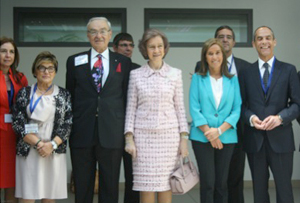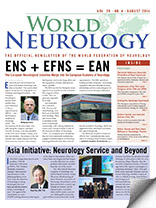
Her Majesty Queen Sofia of Spain (center) and Prof. Vladimir Hachinski (left of Her Majesty), keynote speaker at the II International Symposium on the Advancement of Psychosocial Care and Research in Dementia. Photo courtesy of Agencia DiCYT.
Her Majesty Queen Sofia of Spain has a special interest in Alzheimer’s disease and chaired a symposium on The Advancement of Psychosocial Care and Research in Dementia in May in Salamanca, Spain. It was sponsored by the Fundación Reina Sofia, CRE Alzheimer’s (IMSERSO), Fundación General de la Universidad de Salamanca and other organizations.
Vladimir Hachinski, distinguished university professor, University of Western Ontario, London, Canada, speaking in Spanish on “Can We Prevent or Delay Dementia?” explained that stroke and Alzheimer’s pathologies increase with age, occur together in the same brain and may interact.
Lesions in the brain do not add up; they multiply making it important to control what pathology we can. Currently, no treatment exists for Alzheimer’s, except for the symptoms. On the other hand, all dementias have a vascular component, ranging from 60 percent in frontotemporal dementia to 80 percent in Alzheimer’s disease. Having Alzheimer’s pathology and a vascular component doubles the chances of developing dementia. Currently, Alzheimer’s disease and brain vascular disease are being managed as if they were separate and isolated entities.
An alternative approach is that of vascular cognitive impairment, which is any impairment caused by or associated with vascular factors. Vascular disease is treatable and preventable. Therefore, identifying the vascular components of all dementias offers the possibility to prevent or delay dementia.
Other participants included Ana Mato, Spanish Minister of Health; Benoit Lavallart, leader of Plan Alzheimer’s France, who spoke on “The French National Alzheimer’s Plan”; Marc Wortmann, Alzheimer’s Disease International (AD) on “Global Dementia Policy Overview”; Eamon O’Shea, Irish Center for Social Gerontology (ICSG) on “Psychosocial Interventions for People with Dementia” and Maria Isabel Gonzalez Ingelmo, director of CRE Alzheimer’s International.
Hachinski said he was glad to see the Queen again, whom he had met June 2013 at a symposium in Madrid. He was pleased to return to the University of Salamanca, where he was made a Doctor Honoris Causa in 2000.
